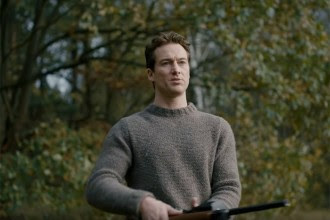BEAT POP BPM LOOP BACKSPIN DROP CODA
Starring some accomplished young German actors, its grimness unspools on Amazon Prime with two main threads. One is a crime procedural involving the work of an FBI-like European security investigative unit, ESI, to take down a soulless entrepreneur engaged in multiple illegal activities, here a particularly lurid business of traffic in human organs.
The crime story is set against the techno beat of Berlin’s club life that burgeoned following the fall of the Berlin Wall; it burst with rebellious energy after East German Communism died. A Vice report notes that when the Wall fell in 1989, an energetic, industrial sound for a new era already existed. But in the ruins of Communist East Berlin, a no-man’s land of transformer stations, power plants, bunkers, hangers, and factories morphed into ravers’ paradises.
These derelict brutalist buildings (where once a Berliner could have been shot for trespassing) became havens energized by German kids’ demand for hard sound. Pumping techno became the backdrop for “...left-wing politics, gender experimentation, nudity, and huge-scale brutalist architecture…” (The Guardian, 2016). *
The work of Marco Kreuzpaintner (right), this is a weird love-letter to Berlin where he had spent a dozen years visiting existing venues like Berghain on which he modeled BEAT’s Club Sonar. But the tribute seems ironic and ambivalent. Here Kreuzpaintner pairs rocking techno with the most brutal of crime, instilling, conditioning, if you will, more revulsion for the club scene than maybe he meant, given his affection for it — even his chapter heads are DJ terms, as though the club were metaphorically orchestrating the crime and its investigation. Below, the story kicks off with club-goers finding blood dripping on them from the bodies of two women suspended from the ceiling who have been carved up for the sale of their organs. Night of revels — not.
Robert Schlag, aka BEAT, above r and below, is played by accomplished young veteran Jannis Niewöhner (Maximilian in Maximilian and Marie de Bourgogne — the terrific series on Starz -- in a wildly different leading role from this one). Right off, Beat describes the feeling of the club as the pure, unconscious comfort of returning to the womb, soothed by the maternal-like heartbeat of throbbing music, a world of play and sublime escape. (And Kreuzpaintner is said to be the first filmmaker to come close to showing what that world feels like.)
Beat is club promoter, involved in all aspects of operation along with the owner, his best friend, Paul, below, (Hanno Koffler, of Free Fall). Paul and his wife have a small boy (Beat’s godson) who needs an organ transplant. They are the closest thing to family in Beat’s life.
Orphaned as a child, Beat sees the world as corrupt and uses drugs and club life to shape a reality he can handle — yet he’s caring to his friends and reliable at work. He runs club programming while being a true creature of the scene — gaunt, hyperactive, strung out, snorting blow and popping pills through days and nights of rocking and casual sex.
We see his recurring dream of being in a park with his parents when they vanished; know he was sent to an orphanage, later adopted. His very early foundation seems to have enabled his current relationships and high-functioning as an adult.
Early on we are thrown off track by a schizy weirdo (below) — in a fine bit of character acting by Kostja Ullmann. (He was in World Without End as Gwenda’s brother, Holger). Named Jasper, he floats in and out of Beat’s periphery, clearly much the worse for his own childhood orphaning and implicated in Beat’s early life and current gruesome events.
Meanwhile ESI is recruiting Beat as an asset to aid in their arrest of Philipp Vossberg (Alexander Fehling of Inglorious Basterds, Homeland, and Three Peaks) who, among other illegal operations, owns the business that traffics in human organs. It’s relentlessly ugly and hard to watch: the capture and murder of migrants and harvesting of their organs. Vossberg coaxes clients desperate for organs into becoming business partners; he uses their auspices as cover for his other criminal enterprises. Beat’s partner, Paul, has been promised an organ for his ailing son and is seduced into Vossberg’s web, making the handsome, sociopathic kingpin a regular at Club Sonar as a stockholder.
We follow a little boy who has been seized for organ donation to Paul’s son and the slow meltdown of the surgeon who works for the harvesting operation and finds his job intolerable.
It takes ESI’s Emilia (Karoline Herfurth: a screenwriter, director, and actress) and her boss, Richard, (Christian Berkel of Inglorious Basterds) some time to woo Beat (all three above) into spying for them on Vossberg but Beat is finally persuaded by his worry for Paul and by ESI’s promise they will trace what happened to his parents. As his handler, Emilia comes to his aid (he calls her ‘Jane Bond’). Beat makes himself useful to Vossberg who begins to trust him, and Emilia in turn finds out about his missing mother and father (shedding some light on his nihilism).
The unimaginable showdown among the main players (above, Vossberg) remains for your discovery which despite some earlier tediousness will not disappoint for charisma, twisted, and shocking.
* For more on the club scene, see Der Klang der Familie (The Sound of Family): Berlin, Techno and the Fall of the Wall; Felix Denk, Sven von Thulen - Google Books.
NOTE: The series is offered on Prime in subtitled and dubbed versions. Dubbings are always terrible, but I watched some of this one to make sure I was on top of the unsavory plot I had already seen subtitled. If you watch, choose the compelling version in German — otherwise it just dies.
The above post was written by
our monthly correspondent, Lee Liberman
















No comments:
Post a Comment